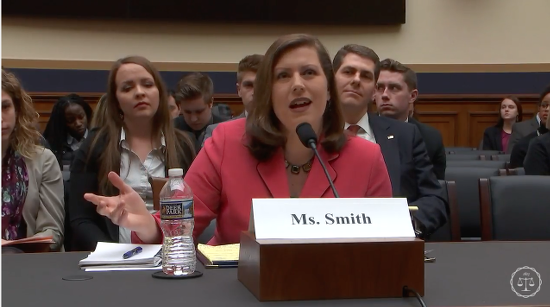Yesterday, the U.S. House Judiciary Committee held a hearing all about “religious liberty.” At one point, however, a representative from conservative legal group Becket couldn’t answer a simple question about whether someone’s faith gave them the right to refuse service to an interracial couple.
Tennessee Rep. Steve Cohen asked Becket’s Senior Counsel Hannah Smith if faith-based discrimination against interracial couples was ever permissible. The correct answer was “No.” Instead, she went on multiple lengthy monologues to avoid saying that one word.
The exchange takes place at the 1:08:44 mark.

COHEN: Ms. Smith… what if… bakers decided that they didn’t want to bake a cake for a interracial couple? Would Loving v. Virginia have any effect, in civil rights laws, in not… requiring them to bake that cake, give them a pizza…?
SMITH: Well, again, just going back and looking at some of the examples that have been part of the public discourse on this subject over the last few years. For example, Walmart decided it didn’t want to bake a cake that had a Confederate flag on it. Should we force Office Depot to print posters that deride Planned Parenthood? No we shouldn’t. There are a variety of different moral views that have been taken by corporations, and individuals, and we protect that free expression because it’s a matter of free speech. And again, I would just point you to the Hurley decision, which was a unanimous opinion at the Supreme Court, where the Supreme Court said that expression trumps anti-discrimination laws. So I think we really need to be sensitive to the fact that these cases are really about expression, and whether we agree or not with the expression, we need to defend the right of the speaker…
COHEN: So you’re saying they could deny an interracial couple because they didn’t agree with interracial marriage, is what you’re saying, because that’s the right of expression?
SMITH: No, that’s not what I said, and I think what’s important to contrast…
COHEN: Can you answer the question?
SMITH: In the Loving case, I think it’s really important to contrast what the Supreme Court said in Obergefell. When you look at the language that Justice Kennedy uses in the majority opinion in Obergefell. He refers to the religious beliefs of those who believe in traditional marriage as decent and honorable. These are sincere beliefs that are held by good people. And the language that the Court — in fact, all nine members of the Court — adopted in that opinion, was one to say, “Look. There are a lot of different views on marriage. We should encourage that diversity of views on marriage. And these are decent and honorable people who hold these views, and we’re not going to deride them here.” Those are the words of Justice Kennedy. So I think there’s a very different case when you’re talking about Obergefell then when you’re talking about a case like Loving.
COHEN: So, in Loving, you’re saying they cannot discriminate against the interracial couple? Yes or no?
SMITH: Look. What I’m saying is race is very different in our society. Okay? In every context.
COHEN: The Supreme Court’s the same, though. Obergefell and Loving are both Supreme Court cases raising the idea that there is a right to get married.
SMITH: So race is very different and race has always been different in our Constitutional lexicon. We have always recognized…
COHEN: So you’re saying they would not be allowed to discriminate…
SMITH: We have always said that the government has a very powerful interest…
COHEN: Ms. Smith, you’re not gonna answer the question. It’s a yes or no answer. Yes or no: Could the couple say, “I will not do you a cake because I don’t believe… my religious beliefs do not allow me to give an interracial couple a cake.” Yes or no?
SMITH: I believe that race is special. Race is different.
Jesus, that got awkward.
Smith refused to admit that religion wasn’t a good reason to discriminate on the basis of race. Maybe that’s because she saw where that line of thought was going.
Our government has a compelling interest in rejecting racial bigotry in public businesses, no matter the reason given by the owners. It’s not like you can choose your race, after all, so you shouldn’t be punished for it.
And that’s precisely why we shouldn’t allow LGBT discrimination in public places, either. Even if the person who owns the company is a Christian.
That’s the problem with Christian bigotry. Just as with so many religious beliefs, there’s no logical consistency to it. The same arguments Christians used against interracial dating mere decades ago — see Bob Jones University — are the ones they’re using against LGBT people today: It’s unnatural, it’s not part of God’s Plan, it’s sanctioning sin, etc.
They’re allowed to think that all they want. Pastors are free to promote bigotry on Sunday mornings. But the government has no business playing along with their silly games.
And the moment you say the government has a right to reject discrimination against interracial couples regardless of the company owner’s beliefs, you’re basically admitting the government has a right to defend LGBT people, too.
(via Secular Coalition for America)




It’s Moving Day for the Friendly ..."
It’s Moving Day for the Friendly ..."
It’s Moving Day for the Friendly ..."
It’s Moving Day for the Friendly ..."